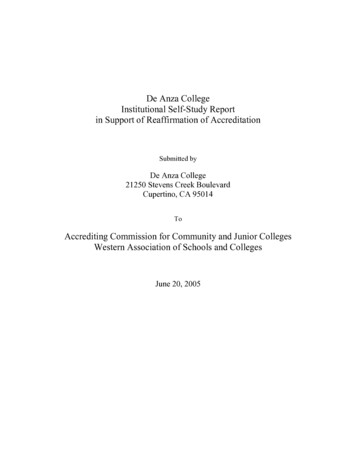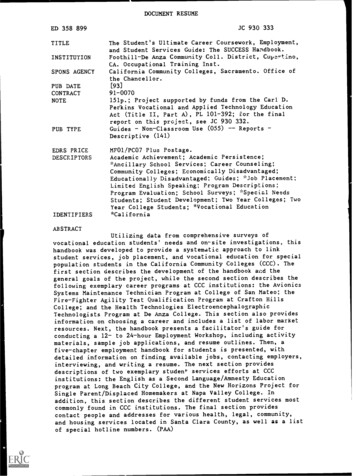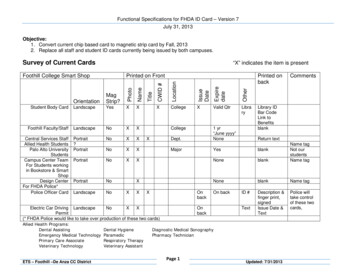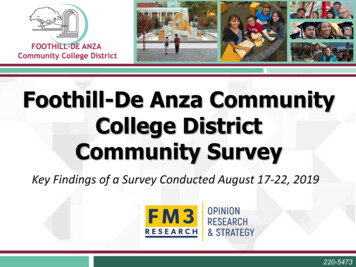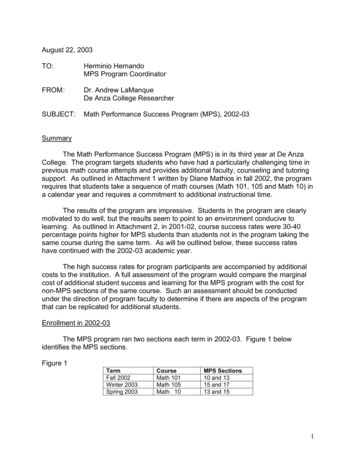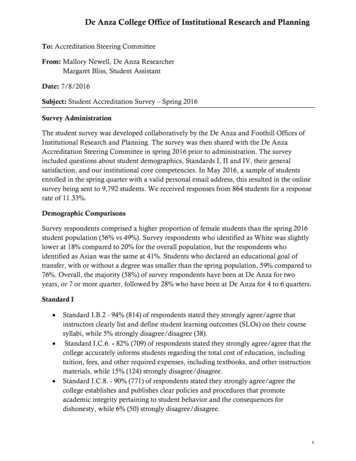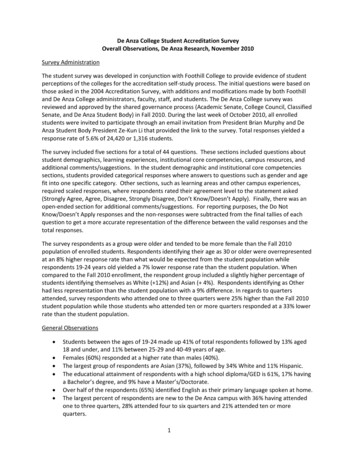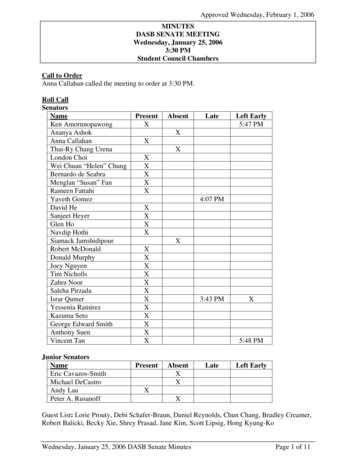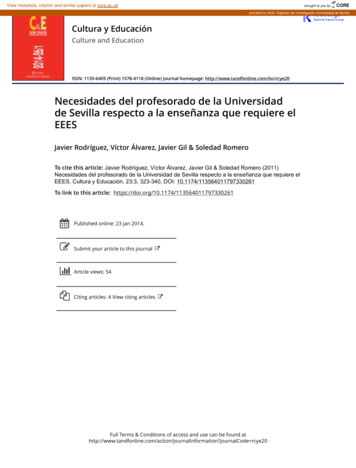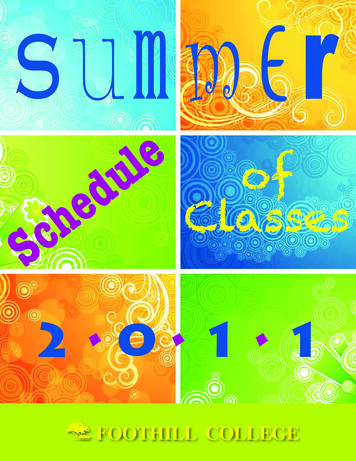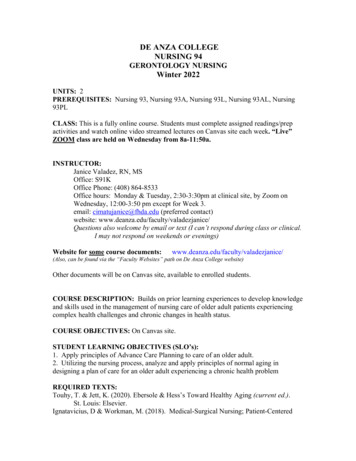
Transcription
DE ANZA COLLEGENURSING 94GERONTOLOGY NURSINGWinter 2022UNITS: 2PREREQUISITES: Nursing 93, Nursing 93A, Nursing 93L, Nursing 93AL, Nursing93PLCLASS: This is a fully online course. Students must complete assigned readings/prepactivities and watch online video streamed lectures on Canvas site each week. “Live”ZOOM class are held on Wednesday from 8a-11:50a.INSTRUCTOR:Janice Valadez, RN, MSOffice: S91KOffice Phone: (408) 864-8533Office hours: Monday & Tuesday, 2:30-3:30pm at clinical site, by Zoom onWednesday, 12:00-3:50 pm except for Week 3.email: cimatujanice@fhda.edu (preferred contact)website: www.deanza.edu/faculty/valadezjanice/Questions also welcome by email or text (I can’t respond during class or clinical.I may not respond on weekends or evenings)Website for some course so, can be found via the “Faculty Websites” path on De Anza College website)Other documents will be on Canvas site, available to enrolled students.COURSE DESCRIPTION: Builds on prior learning experiences to develop knowledgeand skills used in the management of nursing care of older adult patients experiencingcomplex health challenges and chronic changes in health status.COURSE OBJECTIVES: On Canvas site.STUDENT LEARNING OBJECTIVES (SLO’s):1. Apply principles of Advance Care Planning to care of an older adult.2. Utilizing the nursing process, analyze and apply principles of normal aging indesigning a plan of care for an older adult experiencing a chronic health problemREQUIRED TEXTS:Touhy, T. & Jett, K. (2020). Ebersole & Hess’s Toward Healthy Aging (current ed.).St. Louis: Elsevier.Ignatavicius, D & Workman, M. (2018). Medical-Surgical Nursing; Patient-Centered
Collaborative Care, current ed. St. Louis: Elsevier.De Anza College Department of Nursing, Nursing Student Handbook (current year).Also required: purchase of Hesi case studies and exam.HIGHLY RECOMMENDED TEXTS:Lippincott, Williams & Wilkins. (Current edition). Pathophysiology made IncrediblyEasy(Or other pathophysiology text per student preference also acceptable.)RECOMMENDED:Purnell, L. & Paulanka, B. (current ed). Guide to Culturally Competent Care.Philadelphia: FA Davis. Several copies are in the Resource Room.REQUIRED ASSIGNMENTS: Students are required to log in every week and watchthe online videostreamed lecture (approx. 2 hrs per week). In addition, there are assignedreadings, video viewing, discussion boards, weekly assignments, online quizzes, onlineHesi case studies with NCLEX-style practice questions, 1 Midterm Examination, and acomprehensive, computerized Hesi Final. There are alternate item format questions onexams and quizzes (i.e., “Select all that apply,” Matching, True/False, etc.).MATERIALS: Computer/tablet/smart phone with camera and reliable access to the web,Zoom, and the Canvas and Evolve websites, required textbooks/student handbook,materials for notetaking, purchase of Hesi case studies and final examination. Copyand/or distribution of videostreamed lectures and/or PowerPoint slides areexpressly forbidden at any time. This includes after the conclusion of the course.These are proprietary and copyrighted materials. No audio or video recording orstill photography in any form is allowed in live sessions OR from web-basedmaterials or lecture without specific written consent from instructor and willrequire signing an agreement. It is the student’s responsibility to request permissionfrom instructor. Failure to do so will result in a range of a PI for not following directionsto a disqualification for legal/ethical violations.DRESS CODE: Campus uniform (blue scrub) is to be worn whenever on campus, andduring skills testing and simulations in the skills lab.Per DAC and state policy, a mask is required to be worn while inside the classroom oncampus. Students that refuse to wear a mask will be asked to leave class and thesubsequent class period. If a student refuses to leave class, the entire class will becancelled, and administrative reporting will be followed for all occurrences pertaining tothe refusal to wearing a mask.Per DAC policy, students are required to complete a Symptoms Review Survey beforecoming to campus by logging into them at Home Health Status reporting(https://athome.optimumhq.com/login.jsp) and by scanning the QR code before enteringthe classroom.
ATTENDANCE POLICY: Attendance and promptness at all live/Zoom sessions intheir entirety is expected (see Nursing Student Handbook).ZOOM ATTENDANCE POLICY: To meet attendance requirements, students mustalways have their video cameras ON during synchronous Zoom classes and exams.Turning the video camera off during Zoom time may cause the student to be droppedfrom that session, exam to be closed, and be counted as absent.CELL PHONES: Must be turned OFF and stowed away during all Zoom sessions,quizzes, and exams. NO EXCEPTIONS! Cell phones may not be used to audio orvideo record. Cell phones may not be used as cameras or calculators during exams orquizzes. No cameras or other visual recording devices of any kind allowed in thisclass at any time. Unless authorized by instructor, the use of a cell phone, tablet orsmart watch as a camera or for any purpose during class, quizzes, or exams willresult in a PI on FIRST occurrence. Additionally, if a student accesses a phone,tablet, smart watch or camera during an exam or quiz, they will earn a “0” on thatexam/quiz.GRADING:Examinations 200 points**There will be one midterm and a final exam. The midterm exam is worth 100 points andconsists of 50 questions. The final examination is worth 100 points, is comprehensive,and consists of 50 questions. Dates will be distributed at start of course. There will bealternate item format questions on both exams. During the Covid-19 pandemic, examswill be taken on Canvas. The student’s camera must be on for the duration of the exams.Note: if the Hesi computerized final examination is not available during the allotted finalexamination period (i.e., pandemic, power outage, computer or internet failure, Hesicrash, proctoring company crash or other unanticipated problem with the Hesi exam,etc.), students must be prepared to take the final exam at a different time frame.A grade of less than 75% on any exam is considered a failing grade and will result in atest improvement plan which includes (but may not be limited to) requiring the student toperform an analysis of the exam. The form and instructions are on the instructor’sCanvas site and may assist the student in completion of this valuable process. Thisanalysis and other portions of the plan are aimed at maximizing the student’s opportunityfor growth and success.**Exams and quizzes combined totals must be at least 165 points (average of 75%)to pass this course. There are no second chances. Student exams (midterm andHESI final), including quizzes, are final.ExaminationsQuizzes (4 quizzes at 5 points each) *#200 points20 points
Assignments (10 assignments at 5 points each)*50 pointsCase Studies (7 case studies at 5 points each)*@35 pointsTOTAL POSSIBLE:305 points* No late case studies, assignments, or quizzes will be accepted. Due dates and times areon the Canvas site. Late assignments or case studies may only be accepted if thestudent provided written notification (at minimum two days before the deadline)and approved by the instructor. After the instructor’s approval, only ½ of the totalpoints will be credited and awarded for that class assignment or case study. No latequizzes will be accepted unless of emergency, with a written notification of at leasttwo days in advance.# Quizzes will be online and will be timed.@ Case studies must be completed no more than one week prior to due date, aregraded on submission for the current quarter, and students must review and re-submituntil 100% is achieved, by due date/time, in order to earn points.Scores on an assigned case study completed previous to the current quarter will not begraded and students will earn a “zero” score if case study is not completed as assignedin the current quarter. Case study must be completed during the week assigned inthis course in order to be eligible for a grade.NOTE: Not all material that is on the exams will necessarily be discussed in class or onvideo streamed lectures. Exam questions may be related to video streamed lectures,reading/prep material, case studies, application of these and/or previous courses, such asNANDA’s, pathophysiology, pharmacology or anatomy & physiology. Most quiz andexam questions are aimed to test application and above. They will require you to analyzedata and apply your knowledge or evaluate a given client situation. There are alternateitem format questions on exams and quizzes.GRADING SCALE:A 274 – 305 points (90-100%)B 244 – 273.99 points (80-89.99%)C 229 – 243.99 points (75-79.99%)F 228.99 or below (less than 75%)A grade of “C” or better is required to pass the course and progress to quarter 5.Exam and quiz total must be at least 165 points (average of 75%) to pass the course.Per department policy, final grades will not be rounded up (see Student Handbook).NOTE: The student must pass both Nurs 94 and Nurs 94L to progress in the program. If
either of these courses is failed, both must be retaken concurrently (see policy in NursingStudent Handbook).EXTRA CREDIT: Extra credit of up to 6 points may be offered, at the discretion of theinstructor. Examples include optional assignments (on Canvas), participation atcommunity health fairs, flu shot clinics, SNO office/activities, attendance at nursingrelated enrichment activities, and other potential activities (ask instructor). Scale forvolunteerism is 3 hours of extra-curricular activities equals 1 point of extra credit.Maximum possible extra credit points that can be awarded is 6 points. Partial volunteerhours can be combined to total 3 hours, but no partial extra credit points will be given ifcombined hours fall short of 3 total hours. It is the student’s responsibility to providehard copy of documentation of participation in extra credit activities by Week 5 of thecourse.Extra credit points cannot be added to exam or quiz points, nor be used to salvage afailing grade.COURSE EVALUATION: Complete an online “Course Evaluation” and includewritten comments at the completion of course. Each instructor reads and considers eachevaluation and all comments when making modifications to his/her course. Also, theNursing department Curriculum Committee reviews a summary of all course evaluationseach year. All evaluations are to be completed anonymously. Refer to theNursing Department Website for instructions to complete the evaluations. Please be sureto select the correct course name and instructor.Remember to email a “screen shot” to the lead instructor of each survey evaluation. Bringwritten comments to the final exam, where they will be collected by a student and takento the Director until after grades are submitted. Please see Nursing Department websitefor instructions.STUDENT CONCERNS: The nursing faculty is committed to student success andwishes to address student concerns professionally and in a timely manner. In general,most student concerns can and should be resolved directly with the course instructor,including the situation in which the student has an issue with that instructor. Per theNursing Student Handbook, the student will contact the instructor and schedule anappointment to discuss the concerns or issue in question. If the issue is unresolvedfollowing this meeting, the student should refer to the Grievance Process section of theNursing Student Handbook for the next appropriate steps.CONDUCT: Professional behavior, conduct, communication (verbal and nonverbal),and language is expected at all times. A student who does not demonstrate these or whois disruptive or suspected to be under the influence of drugs or alcohol may be asked toleave the class/clinical site/skills lab and/or receive a PI, reflection, recommendation forWithdrawal with Penalty or Disqualification. This includes using a cell phone for anypurpose during class, quizzes, or exams. De Anza College will enforce all policies andprocedures set forth in the Nursing Student Handbook and/or Standards of Student
Conduct (see college catalog).Students will address everyone with the utmost respect and not use exclamatory points ineither verbal or written when addressing them - consider the clinical site and the program.Students will address the instructor by their first or last name without any exclamatorypoint after their name, verbal or written. (For example, Janice!) Students will alwaysinitiate an introductory greeting, verbally or written, before using the instructor’s, staff’s,or peer’s name (for example, Hello Janice, or Dear Mrs. Valadez, is proper, instead ofjust Janice or Janice!). Instructors are not considered friends; therefore, students mustconstantly observe and practice professional relationships. (Teachers are present to teach,mentor, and facilitate student learning toward their academic goals). The teacher-studentinteraction may be friendly but must be always respectful and professional.DISRUPTIVE BEHAVIOR: De Anza College will enforce all policies and proceduresset forth in the Standards of Student Conduct (see college catalog). Any studentdisrupting a class may be asked to leave that class. Administrative follow-up may result.ACADEMIC INTEGRITY POLICY: All examinations, quizzes, assignments andhomework are considered to be individual (not group) work unless explicitly stated bythe instructor. Dishonest behavior such as cheating (or attempts to cheat, talking duringquizzes or exams, or placing yourself in a situation where cheating may be perceived) onany required class-related work, quizzes, or tests will result in a failing grade on thatassignment or examination and a program-long Plan for Improvement.TUTORING AND SUPPORT SERVICES: If a student desires tutoring for skills,critical thinking, or paperwork in this course, please notify your Lead Instructor and atutor will be found for you. There are also free campus and online resources available toyou (see below). If the instructor feels that student's language skills are interfering withthe student's success in the class, the instructor may suggest the student to utilize theservices of Academic Skills and Tutorial Center, Listening and Speaking Lab or otherstudent resources on campus.Student Success CenterNeed help? De Anza's Student Success Center offers free online and on-campus tutoringand workshops! Visit http://www.deanza.edu/ studentsuccess for hours and information. Academic Skills Center for workshops in ATC 302General Subject tutoring in ATC 304Listening & Speaking and World Language support in ATC 313Math, Science and Technology tutoring in S43Writing and Reading tutoring in ATC 309Student Success Center Resources are available online to all De Anza students onCanvas: https://deanza.instructure.com/enroll/MAF7Y8
IMPORTANT RESOURCES:1. Nursing Department website: http://www.deanza.edu/nursing/ NOTE: new StudentHandbook policies are added to the website periodically; students are responsible forchecking the site for updated policies on a periodic basis.2. Library Web Address: www.deanza.edu/library06/21
DE ANZA COLLEGE NURSING 94 GERONTOLOGY NURSING Winter 2022 UNITS: 2 PREREQUISITES: Nursing 93, Nursing 93A, Nursing 93L, Nursing 93AL, Nursing 93PL CLASS: This is a fully online course.Students must complete assigned readings/prep activities and watch online video streamed lectures on Canvas site each week.
